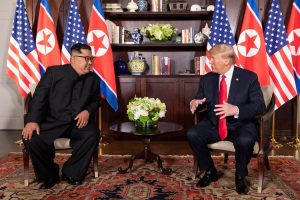One way to describe the historic Trump-Kim summit is to twist the famous line of Neil Armstrong, the first person to set foot on the moon. The unprecedented meeting represents “one giant leap for both Donald Trump and Kim Jong Un, one small step for peace on the Korean Peninsula.”
It is one giant leap for the two leaders, because merely half a year ago they were exchanging a barrage of nuclear threats and personal insults. It would have been dismissed as a wild fantasy if anybody had suggested back then that the two antagonists would meet in person, with handshakes and smiling faces under the global spotlight.
It is one small step for peace on the Korean Peninsula, because the two leaders didn’t sign a peace treaty that would end de jure the Korean War, which ended de facto in 1953. Nor did the joint statement signed by them set out in details when and how to accomplish “complete denuclearization of the Korean Peninsula,” the declared top priority of the Trump administration’s policy toward North Korea.
But “a journey of one thousand miles starts with a single step,” as the Chinese saying goes. The summit may well be a small step toward the giant leap of permanent peace in Northeast Asia. In this sense, they went, they met, and they rewrote history.
Given China’s special relationship with North Korea, one cannot help wondering the implications of the summit for China. Prior to the June 12 summit, Kim Jong Un traveled twice to China to meet with President Xi Jinping. Another unmistakable sign of China’s critical role in the summit is that Kim traveled to Singapore on an Air China Boeing 747. Is the summit also a home run for Beijing?
One way to answer this question is to situate the summit in the historical context of China’s complicated relations with the Korean Peninsula. For many Chinese, their memories about China-North Korea relations probably start with China’s immense sacrifice during the Korean War and — since the end of that war — its massive economic assistance to and nearly unconditional diplomatic support for Pyongyang. They naturally expect North Korea to reciprocate Chinese generosity and friendship with gratitude and loyalty.
But for many Koreans (regardless of which side of the Demilitarized Zone they come from), their memories about China probably go back way before the Korean War. For hundreds of years the Korean Peninsula was a vassal state of the Middle Kingdom. It was firmly in the Chinese orbit of influence until 1895, when China formally renounced its dominance over the peninsula due to its defeat in the Sino-Japanese War of 1894.
Unchallenged Chinese cultural and political influence apparently resulted in deep-rooted resentment of the Middle Kingdom, which goes a long way in explaining the rise of Korean nationalism vis-à-vis China. One telltale sign of this nationalism is Hangeul, the Korean alphabet, which represents a deliberate effort to eliminate Chinese cultural influence (i.e., desinification).
Another sign is Beijing’s convoluted relations with Pyongyang since the 1940s, despite shared political ideology. That Kim Jong Un — who became the supreme leader of North Korea in 2011 — didn’t pay his first visit to China until less than three months before the Singapore summit is but one example of the estranged relationship. The centripetal force of shared ideology ostensibly pales in comparison with the potent centrifugal force of Korean nationalism.
Beijing’s troubles with Korean nationalism do not stop with North Korea, however. Shared historical memories about China may have played an important role in South Korean President Moon Jae-in’s decision to meet with Kim Jong Un twice this year.
Beijing and Seoul established diplomatic ties in 1992 and have evolved to be important economic partners. One indication of how close Beijing and Seoul have become is that Park Geun-hye, Moon’s predecessor, stood next to Xi atop the Gate of Heavenly Peace during the 2015 massive military parade in commemoration of the 70th anniversary of Chinese victory over Japan.
Yet a year later, when Park decided to go ahead with installation of the U.S. Terminal High Altitude Area Defense (THAAD) system in response to North Korea’s missile tests, Beijing reacted with vehement opposition. The ensuing diplomatic standoff sent bilateral relations to their lowest level since 1992. China’s nationwide boycotts of South Korean businesses — including a sharp decline in Seoul-bound Chinese tourists — dealt a heavy blow to the South Korean economy.
There was little doubt that many South Koreans viewed Beijing’s reactions as diplomatic and economic coercion, a powerful reminder of China’s historical dominance. Elected in the immediate aftermath of the THAAD controversy, President Moon thus should have added incentive to reach out to his North Korean counterpart. A unified Korean Peninsula certainly stands a better chance of asserting independence vis-à-vis China.
In so far as Pyongyang is concerned, Western sanctions have forced it to be nearly totally dependent on Beijing. Such dependence, many Chinese tend to assume, offers Beijing unrivaled strategic leverage over Pyongyang. But this dependence, coupled with historical memories, could lead to resentment instead of gratitude. No wonder a prominent Chinese historian asserted that North Korea “is not sure of China, and has a kind of revenge mentality.”
What conclusion can be drawn from the above analysis? China may not be the biggest loser out of the Trump-Kim summit, but it certainly is not the biggest winner. For Washington, its détente with Pyongyang significantly depreciates the strategic value of Beijing. This explains why, according to many Chinese analysts, Trump decided to go back on his word and go ahead with a trade war with China.
Now that North Korea and the United States are mending their relations, it is also time for China to reset its policy toward Pyongyang and Seoul. If Beijing continues to ignore the power of nationalism that unites the two Koreas, it will probably have to face a reunified Korean Peninsula allied with the United States, an outcome that is decidedly detrimental to its best interests.

































